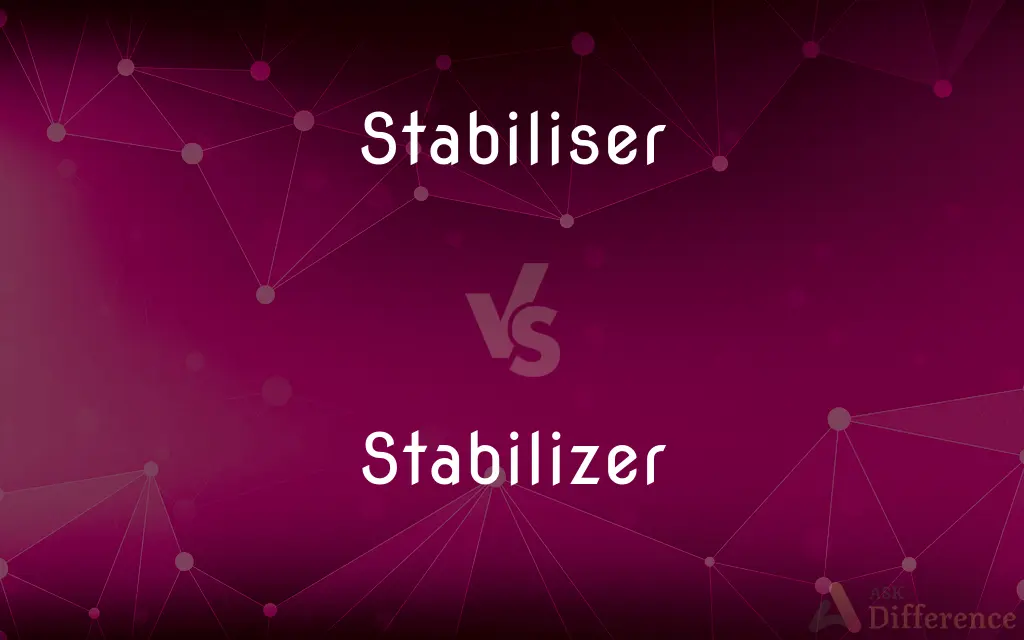Stabiliser vs. Stabilizer — What's the Difference?
By Tayyaba Rehman & Fiza Rafique — Updated on April 24, 2024
"Stabiliser" and "stabilizer" refer to the same concept or device that provides stability, differing only in spelling; "stabiliser" is preferred in British English, while "stabilizer" is used in American English.

Difference Between Stabiliser and Stabilizer
Table of Contents
ADVERTISEMENT
Key Differences
"Stabiliser" is the spelling commonly used in British English to refer to devices that maintain stability, such as in electrical systems or photographic equipment. Whereas "stabilizer" is the American English variant, emphasizing the same functionalities but adapted to the spelling norms of the United States.
In terms of usage, "stabiliser" appears frequently in literature and manuals that adhere to British English standards, providing a sense of familiarity and correctness in those regions. On the other hand, "stabilizer" aligns with American English publications and is preferred in the U.S., impacting everything from academic texts to everyday language.
For technology products like camera gimbals or aircraft parts, "stabiliser" might be used in marketing and technical descriptions within the UK and Commonwealth countries. Conversely, "stabilizer" is the term likely found on packaging and user manuals in the United States.
In educational contexts, British schools teach the "stabiliser" spelling, which aligns with other British English spellings like "colour" and "favour". Meanwhile, American institutions use "stabilizer," consistent with other Americanized spellings such as "color" and "favor".
Online search trends show that "stabiliser" is often searched in regions like the UK, Australia, and India, reflecting the global influence of British English. In contrast, "stabilizer" dominates search queries in the U.S. and other regions influenced by American English.
ADVERTISEMENT
Comparison Chart
Preferred Spelling
British English
American English
Usage in Literature
Common in the UK and the Commonwealth
Common in the United States
Educational Standards
Taught in British English curricula
Taught in American English curricula
Online Search Trends
More common in regions influenced by British English
More common in regions influenced by American English
Technological Products
Often labeled as "stabiliser" in British markets
Often labeled as "stabilizer" in American markets
Compare with Definitions
Stabiliser
An additive that maintains the physical properties of substances.
This cream contains a natural stabiliser to maintain its consistency.
Stabilizer
An aircraft component that assists in maintaining a steady flight.
The airplane’s stabilizer was adjusted to improve handling.
Stabiliser
A device used to maintain stability.
The camera’s stabiliser helps capture smooth video even when moving.
Stabilizer
A device that provides stability, especially mechanically.
We installed a stabilizer on the boat to prevent rocking.
Stabiliser
A chemical agent that prevents unwanted changes in color and taste.
Food manufacturers often use a stabiliser in packaged foods.
Stabilizer
An additive that helps preserve the integrity of other substances.
The stabilizer in the paint prevents it from fading.
Stabiliser
A part of an aircraft that helps control its attitude.
The tail stabiliser is crucial for the plane's balance.
Stabilizer
A tool or system that ensures constant electrical output.
The new stabilizer can handle up to 10,000 volts.
Stabiliser
A circuit or mechanism that maintains the voltage in electrical systems.
The voltage stabiliser protects appliances from power surges.
Stabilizer
A substance used to keep products stable under various conditions.
The stabilizer in this beverage keeps the flavor consistent.
Stabiliser
(non-Oxford British spelling) stabilizer.
Stabilizer
One that makes or keeps something stable
"The New Deal equipped the economy with built-in stabilizers" (Arthur M. Schlesinger, Jr.).
Stabiliser
A device for making something stable
Stabilizer
A device, such as a gyroscopically controlled fin, that prevents excessive rolling of a ship in heavy seas.
Stabilizer
An airfoil that stabilizes an aircraft or missile in flight.
Stabilizer
(Chemistry) A substance that renders or maintains a solution, mixture, suspension, or state resistant to chemical change.
Stabilizer
Any person or thing that brings stability.
Stabilizer
Any substance added to something in order to stabilize it.
Stabilizer
An additional wheel on a bicycle to keep it upright to assist a learner.
Stabilizer
A gyroscopically controlled fin or similar device that prevents the excess rolling of a ship in rough seas.
Stabilizer
An airfoil that stabilizes the flight of an aircraft or missile.
Stabilizer
(textiles) A piece of backing fabric used in embroidery.
Stabilizer
(mathematics) For a group operating on a set and an element x of the set, the set of all group elements fixing x.
Stabilizer
A chemical that is added to a solution or mixture or suspension to maintain it in a stable or unchanging state
Stabilizer
Airfoil consisting of a device for stabilizing an aircraft
Stabilizer
A device for making something stable
Common Curiosities
Are there any functional differences between devices labeled as "stabiliser" and "stabilizer"?
No, there are no functional differences; the terms simply reflect regional spelling variations.
What is the main difference between "stabiliser" and "stabilizer"?
The main difference is in the spelling; "stabiliser" is British English and "stabilizer" is American English.
In which countries might I see "stabiliser" used more frequently?
"Stabiliser" is more frequently used in the UK, Australia, and other Commonwealth countries.
Can "stabiliser" and "stabilizer" be used interchangeably in writing?
Yes, they can be used interchangeably based on the regional spelling preferences of the audience.
Does the spelling variation affect online search results?
Yes, searching for "stabiliser" might yield more British-focused content, whereas "stabilizer" may bring up American-focused content.
Are "stabiliser" and "stabilizer" taught differently in schools around the world?
Yes, the spelling taught usually aligns with whether the country uses British or American English standards.
Is it important to know both spellings?
Knowing both spellings is beneficial for understanding and adapting to different English-language audiences.
Is one spelling more correct than the other in scientific contexts?
Neither spelling is more correct; usage should align with the regional standards of the publication or audience.
Does the choice between "stabiliser" and "stabilizer" influence SEO?
Yes, using the regionally preferred spelling can improve SEO in that region.
How do international companies handle the spelling difference in global markets?
International companies often localize content, including spelling, to suit regional markets.
Can using the wrong variant affect my document's professionalism?
Using the variant that does not align with the intended audience's standards might affect the perceived professionalism of a document.
What should non-native English speakers know about these variations?
Non-native speakers should be aware of regional differences to enhance comprehension and communication.
Will using "stabilizer" in the UK be seen as incorrect?
It might be marked as an Americanism but generally understood and not considered incorrect.
Are there specific industries where one spelling is preferred over the other?
The preference generally aligns with regional language norms rather than specific industries.
How do manufacturers decide which spelling to use on products?
Manufacturers typically choose the spelling that corresponds with the primary market of their product.
Share Your Discovery

Previous Comparison
Content vs. Meager
Next Comparison
Anomaly vs. InconsistencyAuthor Spotlight
Written by
Tayyaba RehmanTayyaba Rehman is a distinguished writer, currently serving as a primary contributor to askdifference.com. As a researcher in semantics and etymology, Tayyaba's passion for the complexity of languages and their distinctions has found a perfect home on the platform. Tayyaba delves into the intricacies of language, distinguishing between commonly confused words and phrases, thereby providing clarity for readers worldwide.
Co-written by
Fiza RafiqueFiza Rafique is a skilled content writer at AskDifference.com, where she meticulously refines and enhances written pieces. Drawing from her vast editorial expertise, Fiza ensures clarity, accuracy, and precision in every article. Passionate about language, she continually seeks to elevate the quality of content for readers worldwide.














































